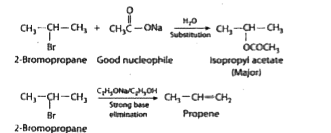Paragraph III
Elimination reactions of alkyl halides are important reactions that compete with substitution reactions. An alkyl halide with hydrogen atoms on beta-carbon atom when reacted with a base or a nucleophile can undergo either substitution (SN1 and SN2) or elimination. The path of the reaction will be determined by the nature of the alkyl halide, strength and size of the base/nucleophilie, reaction conditions and solvent used. In general, bulkier nucleophile acts as base and removes a proton because substitution is hindered due to steric reasons.
2-Bromopropane is separately heated with aqueous CH3CO2Na or with CH3CH2ONaorwithCH_3CH_2 OH, the major product obtained in each case, respectively, isSolution in Malayalam
propene, isopropyl ethyl ether
isopropyl acetate, propene
isopropyl acetate, isopropyl ethyl ether
propene in both the cases
The correct Answer is:B
The reaction involved is

Similar Questions
Elimination reactions (especially β-elimination) are as common as the nucleophilic substitution reaction in case of alkyl halides. Specify the reagents used in both cases.
View SolutionElimination reactions (especially beta -elimination) are as common as the nucleophilic substitution reaction in case of alkyl halides. Specify the reagents used in both cases.
View SolutionWhen haloalkanes with Beta -hydrogen atom are boiled with alcoholic solution of KOH, they undergo elimination of hyarogen halide resulting in the formation of alkenes. These reactions are called Beta -elimination reactions or dehydrohalogenation reactions. These reactions follow Saytzeff's rule. Substitution and elimination reactions often compete with each other. Mostly bases behave as nucleophiles and therefore can engage in substitution or elimination reactions depending upon the alkyl halide and the reaction conditions. Among the following the most reactive towards alcoholic KOH is
View SolutionWhen haloalkanes with beta -hydrogen atom are boiled with alcoholic solution of KOH, they undergo elimination of hyarogen halide resulting in the formation of alkenes. These reactions are called beta -elimination reactions or dehydrohalogenation reactions. These reactions follow Saytzeff's rule. Substitution and elimination reactions often compete with each other. Mostly bases behave as nucleophiles and therefore can engage in substitution or elimination reactions depending upon the alkyl halide and the reaction conditions. In the elimination reactions, the reactivity of alkyl halides follow the sequence
View SolutionWhen haloalkanes with β-hydrogen atom are boiled with alcoholic solution of KOH, they undergo elimination of hyarogen halide resulting in the formation of alkenes. These reactions are called β-elimination reactions or dehydrohalogenation reactions. These reactions follow Saytzeff's rule. Substitution and elimination reactions often compete with each other. Mostly bases behave as nucleophiles and therefore can engage in substitution or elimination reactions depending upon the alkyl halide and the reaction conditions.
The ease of dehydrohalogenation of alkyl halide with alcoholic KOH is
View SolutionWhen haloalkanes with Bη-hydrogen atom are boiled with alcoholic solution of KOH, they undergo elimination of hyarogen halide resulting in the formation of alkenes. These reactions are called Bη-elimination reactions or dehydrohalogenation reactions. These reactions follow Saytzeff's rule. Substitution and elimination reactions often compete with each other. Mostly bases behave as nucleophiles and therefore can engage in substitution or elimination reactions depending upon the alkyl halide and the reaction conditions.
Among the following the most reactive towards alcoholic KOH is
View SolutionWhen haloalkanes with Beta -hydrogen atom are boiled with alcoholic solution of KOH, they undergo elimination of hyarogen halide resulting in the formation of alkenes. These reactions are called Beta -elimination reactions or dehydrohalogenation reactions. These reactions follow Saytzeff's rule. Substitution and elimination reactions often compete with each other. Mostly bases behave as nucleophiles and therefore can engage in substitution or elimination reactions depending upon the alkyl halide and the reaction conditions. In the elimination reactions, the reactivity of alkyl halides follow the sequence
View SolutionWhen haloalkanes with Beta -hydrogen atom are boiled with alcoholic solution of KOH, they undergo elimination of hyarogen halide resulting in the formation of alkenes. These reactions are called Beta -elimination reactions or dehydrohalogenation reactions. These reactions follow Saytzeff's rule. Substitution and elimination reactions often compete with each other. Mostly bases behave as nucleophiles and therefore can engage in substitution or elimination reactions depending upon the alkyl halide and the reaction conditions. The ease of dehydrohalogenation of alkyl halide with alcoholic KOH is
View Solution
